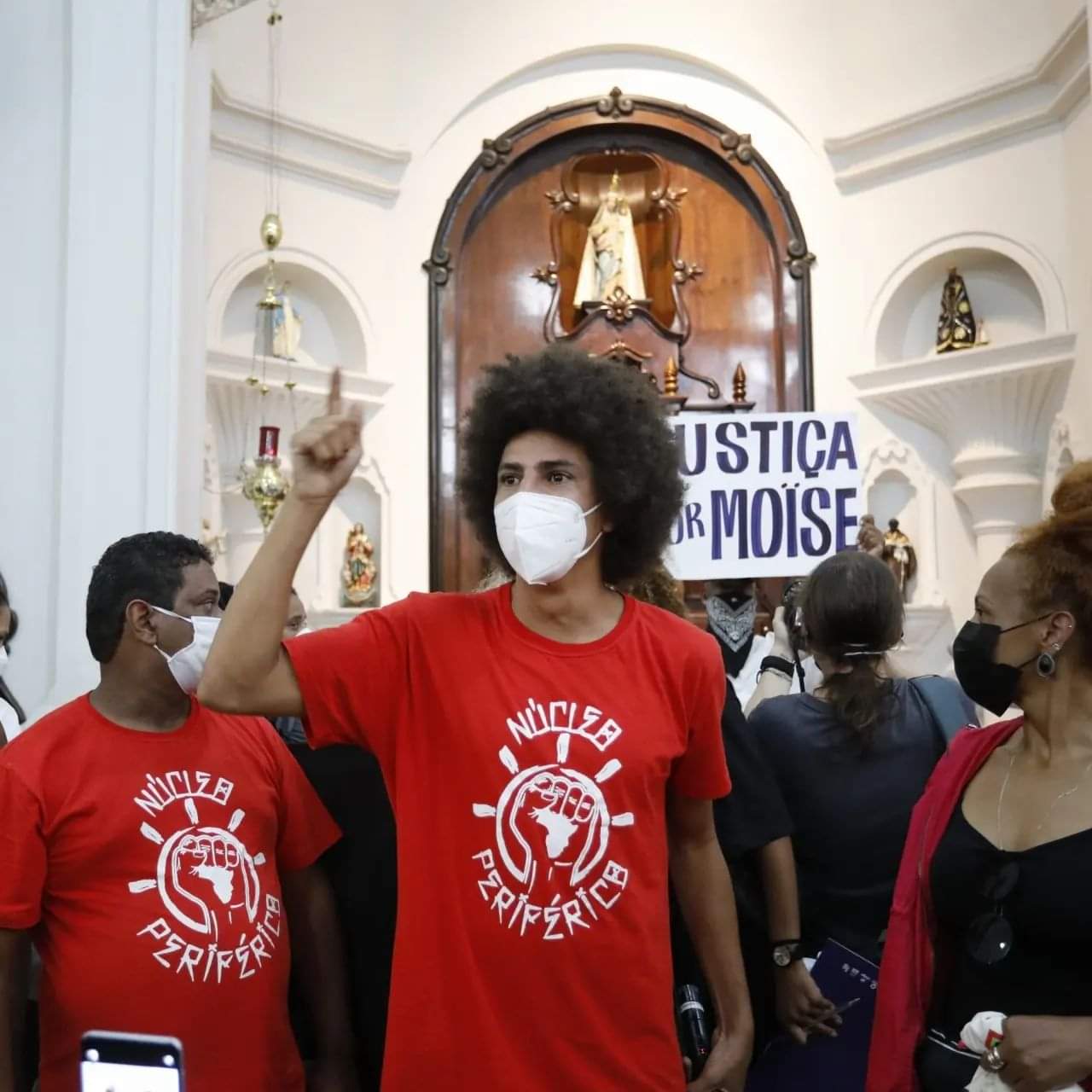SÃO PAULO – A protest of Black activists against the killing of a Congolese refugee in Brazil ended up with a church being occupied by a number of protestors at the end of Mass.
On February 5, Black organizations organized demonstrations in several Brazilian cities protesting the killing of Moïse Kabagambe, a Congolese refugee who was beaten to death at a Rio de Janeiro beach kiosk on January 24 after demanding delayed payments from his manager.
Kabagambe’s homicide was seen by many in the South American country as a consequence of systemic racism.
RELATED: Brutal killing of Congolese refugee causes outrage in Brazil
A few days later, on February 2, another killing further outraged many Brazilians. Durval Teófilo Filho, a Black worker, was shot dead by a neighbor as he approached the entrance of their apartment complex. Aurélio Alves Bezerra, a Navy sergeant, allegedly shot at Teófilo because he thought he was a thief. As he realized the man was unarmed and was his neighbor, he took him to the hospital, but he later died.
The victim’s wife, as well as many activists, said he was killed because he was Black.
During the Feb. 5 demonstrations, protestors honored Kabagambe and Teófilo and demanded the end of racism in Brail, especially violence against Black people.
In Curitiba, Paraná State, a group of Black activists gathered in front of the Church of Our Lady of the Rosary of the Black Men of Saint Benedict. The church was built in the 1940s at the same area of a previous church, an 18th century building constructed by slaves.
Led by city council member and Black activist Renato Freitas, the activists carried banners against racism and called for justice in Kabagambe’s case.
When slavery was legal in Brazil, from 1500 until it was abolished in 1888, Africans and Afro-Brazilians were commonly not allowed to frequent the same church as the white ruling class. Many times, enslaved people and Black freedmen created Catholic fraternities, which organized the building of their own churches and cemeteries. Some of these fraternities played an important role in buying freedom for slaves.
A story published by the left-wing newspaper Brasil de Fato reported that a deacon requested the protestors leave the area because they were supposedly disturbing the churchgoers who were leaving the church after Mass. That was when the demonstrators decided to enter the church and perform a symbolic protest.
A video of the event showed Freitas saying that “most of the Catholic and Evangelical churches supported evil, supported a policeman who is ruling and who said that everybody [suspects of crimes] could be killed,” in a reference to President Jair Bolsonaro, who actually is a retired Army captain. Bolsonaro has always advocated zero-tolerance policies on crime.
The protest enraged many in the Church. The Archdiocese of Curitiba released a statement a few days later condemning it.
“The Archdiocese of Curitiba’s stance is of repudiation of such injurious profanity. The law and free citizenship were equally attacked,” the statement read.
The statement emphasized that the racial issues in Brazil require “much honest reflection and analysis which promote public policies in order to generate the equality of rights.” However, the text clled the protest as an act of “intemperance.”
The current political polarization in Brazil quickly exacerbated the controversy. Criticism of the protest grew rapidly among Bolsonaro’s supporters on social media. The president himself published a commentary on the case on February 7.
“Believing that it will take the power again, the Left shows its true face of hate and despise to our people’s traditions,” he said.
“If such criminals do not respect God’s house, a sacred place, and offend the faith of millions of Christians, who will they respect?” Bolsonaro asked.
Conservative Catholic movements like the Plinio Corrêa de Oliveira Institute (IPCO) – made up of former members of the Brazilian Society for the Defense of Tradition, Family, and Property –denounced the Black movement demonstration.
“The Catholic Church symbolizes everything the left-wing rejects and calls ‘patriarchal and Fascist’,” said IPCO member Frederico Viotti.
He recalled recent cases of the attack on churches during demonstrations in Chile, Mexico, and Argentina.
“The Church preaches everything they combat. The left-wing takes advantage of the Catholics’ weakness at this moment. Catholics are afraid to defend themselves and to declare the whole truth,” he said.
The IPCO organized an act of reparation to the church after the protest.
In the opinion of theologian Mario Betiato, who lives in Curitiba, “systemic racism in Brazil is real and must be fought – and the Bishops’ Conference endorses such struggle – but the method used by that group is not supported by Christian theology.”
“Reasonable citizens all over Brazil have been protesting against hate speech, which is laudable. However, that demonstration in the church signals and reproduces hate speech,” he reasoned.
Cristina Silveira de Oliveira, who heads the Afro Brazilian Pastoral ministry in Curitiba and Paraná State, said that it was a legitimate protest.
“The demonstration defended life and that is what matters. The Church needs to be sympathetic to the people’s needs,” she told Crux.
De Oliveira pointed out that all Black movements’ marches in the city first gather in front of the Church of the Rosary.
“It is a great reference for Black people in Curitiba. The Church needs to be open to dialogue and always defend the right to life and peace,” she said.













